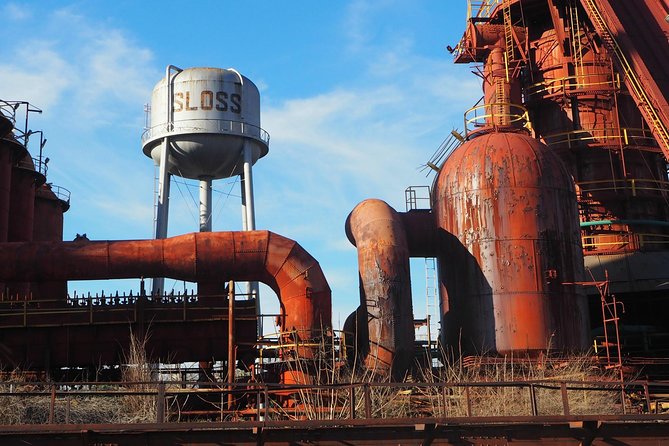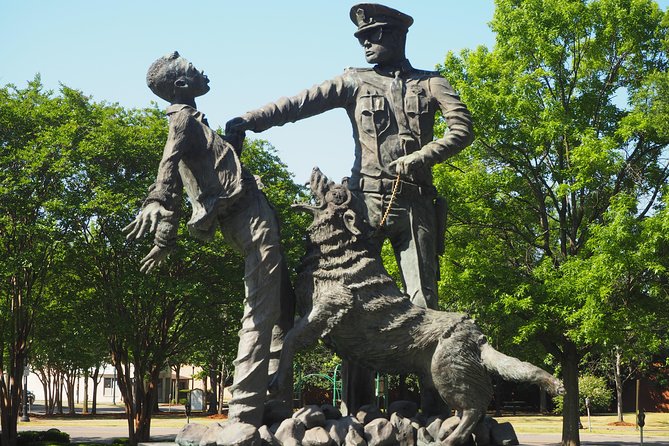Immersed in a tapestry of history, Birmingham’s past echoes like a timeless melody, each note resonating with stories waiting to be uncovered. From the echoes of its founding to the transformative moments of the Civil Rights Movement, the city’s narrative weaves a complex yet captivating tale.
As visitors begin to unravel the layers of Birmingham’s historical tapestry, they will find themselves standing at the intersection of tradition and progress, where each landmark holds a key to unlocking the city’s enduring legacy.
Key Points

- Birmingham, founded in 1871, played a significant role in the Civil Rights Movement.
- Known for its steel industry and the Alabama Jazz Hall of Fame.
- Home to the world’s largest cast iron statue, the Vulcan statue.
- Offers various tours showcasing its rich history and landmarks.
Birmingham’s Founding and Early Years

How did Birmingham, Alabama, come to be founded, and what characterized its early years as a city rooted in history and progress?
Birmingham owes its origins to the founding pioneers who saw potential in the area’s rich natural resources. The city’s early settlements were driven by the iron and steel industry, attracting workers and entrepreneurs seeking new opportunities. As these settlements grew, Birmingham quickly became known for its industrial prowess and innovative spirit.
The melding of hard work and vision laid the foundation for a city that would play a significant role in shaping the landscape of the South. The legacy of these early years can still be seen today in Birmingham’s vibrant culture and historical landmarks.
Birmingham’s Role in Civil Rights
During the Civil Rights Movement, Birmingham, Alabama, played a pivotal role in advancing social justice and equality. The city’s history is deeply intertwined with the struggles and triumphs of the movement, leaving a lasting impact on the fight against segregation and discrimination.
Here are four key points highlighting Birmingham’s role in the Civil Rights Movement:
-
Birmingham Campaign: The city was a focal point for civil rights activities, including the famous Birmingham Campaign of 1963 led by Martin Luther King Jr.
-
Letter from Birmingham Jail: King’s influential letter was penned during his time in a Birmingham jail, emphasizing the urgency of the civil rights cause.
-
16th Street Baptist Church Bombing: The tragic bombing in 1963 targeted this church, resulting in the deaths of four young African American girls.
-
Desegregation Efforts: Birmingham witnessed significant desegregation efforts in schools, businesses, and public spaces, marking milestones in the fight against segregation.
Steel Industry and Alabama Jazz
Birmingham’s vibrant history intertwines the resilience of its steel industry with the soulful rhythms of the Alabama Jazz scene. The city’s steel industry played a crucial role in its development, attracting workers from around the country to fuel its growth. Birmingham became known as the ‘Pittsburgh of the South’ due to its significant iron and steel production.
This industrial backdrop provided a unique setting for the emergence of Alabama Jazz, a genre deeply rooted in African American culture. The Alabama Jazz Hall of Fame stands as a tribute to the city’s rich musical heritage, showcasing the contributions of legendary artists.
The fusion of Birmingham’s industrial past with the melodious notes of jazz music creates a harmonious narrative of cultural evolution.
The Iconic Vulcan Statue
Standing tall on Red Mountain overlooking Birmingham, the iconic Vulcan statue symbolizes the city’s industrial prowess and rich history. The statue, located in Vulcan Park, is a must-see landmark for visitors to Birmingham. Here are some fascinating facts about this iconic statue:
- Vulcan is the largest cast iron statue globally, standing at an impressive 56 feet tall.
- The statue was created as Birmingham’s entry for the 1904 World’s Fair in St. Louis.
- Vulcan holds a spear and is known as the Roman god of fire and forge, representing Birmingham’s industrial roots.
- Visitors can explore the history of Vulcan and enjoy panoramic views of Birmingham from the observation tower in Vulcan Park.
Birmingham’s Historical Significance
With its founding dating back to 1871, Birmingham holds a pivotal place in American history due to its significant role in the Civil Rights Movement and its renowned steel industry.
The city’s involvement in the Civil Rights Movement marked a turning point in the fight for equality, with key events such as the Birmingham Campaign bringing national attention to the cause.
Birmingham is home to numerous historical landmarks that showcase its rich past, including the 16th Street Baptist Church, where a tragic bombing occurred in 1963, and the Birmingham Civil Rights Institute, which preserves the history of the movement.
These sites stand as reminders of Birmingham’s enduring significance in shaping the course of American history.
Common questions
What Are Some Popular Food and Dining Options in Birmingham That Showcase the City’s History and Culture?
Birmingham boasts culinary traditions rich in heritage foods that showcase the city’s vibrant history and culture. From soul food joints to BBQ pits, visitors can savor authentic flavors that tell tales of Birmingham’s past.
Are There Any Lesser-Known Historical Sites or Hidden Gems in Birmingham That Are Worth Visiting?
For those looking to explore Birmingham’s hidden treasures, off the beaten path, consider visiting forgotten landmarks and unexplored corners. These lesser-known historical sites offer unique insights into the city’s rich and diverse heritage.
How Has Birmingham’s Architecture Evolved Over the Years, and Are There Any Notable Buildings or Structures That Represent Different Eras in the City’s History?
Birmingham’s architectural evolution showcases diverse influences over the years. Iconic landmarks like the Alabama Theatre reflect historic grandeur, while modern structures like Regions Field symbolize contemporary design. These buildings encapsulate different eras in the city’s rich history.
Are There Any Annual Events or Festivals in Birmingham That Celebrate Its Historical Heritage or Cultural Diversity?
Birmingham hosts heritage festivals, community parades, and historical reenactments. Visitors can immerse in cultural workshops celebrating the city’s diverse past. These events showcase Birmingham’s rich heritage and offer engaging experiences for all.
What Are Some Unique Ways to Explore Birmingham’s History Beyond Traditional Tours, Such as Self-Guided Walking Routes or Interactive Experiences?
Travelers can explore Birmingham’s history through interactive exhibits and virtual experiences. Engage with local storytellers and historical reenactments for a unique perspective. These immersive methods offer a deeper understanding beyond traditional tours.
Not for you? Here's more of our most recent tour reviews happening neaby
Sum Up
To sum it up, Birmingham’s historical highlights offer a captivating glimpse into the city’s past, showcasing its resilience, progress, and cultural significance.
From its founding in 1871 to its pivotal role in the Civil Rights Movement, Birmingham’s story is one of triumph, struggle, and transformation.
With iconic landmarks like the Vulcan statue and vibrant industries like steel and jazz, Birmingham’s rich history continues to shape its present identity, inviting visitors to explore and appreciate its remarkable legacy.






